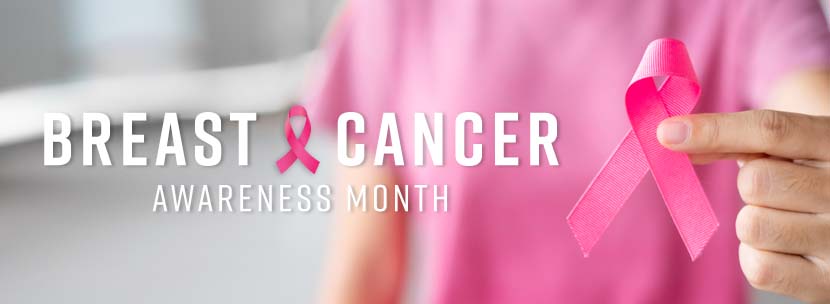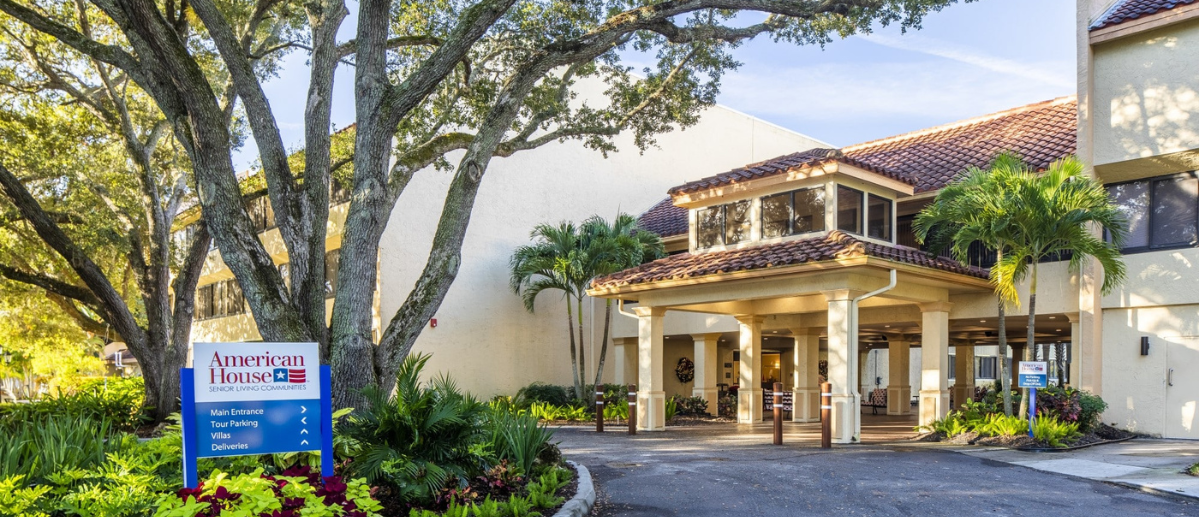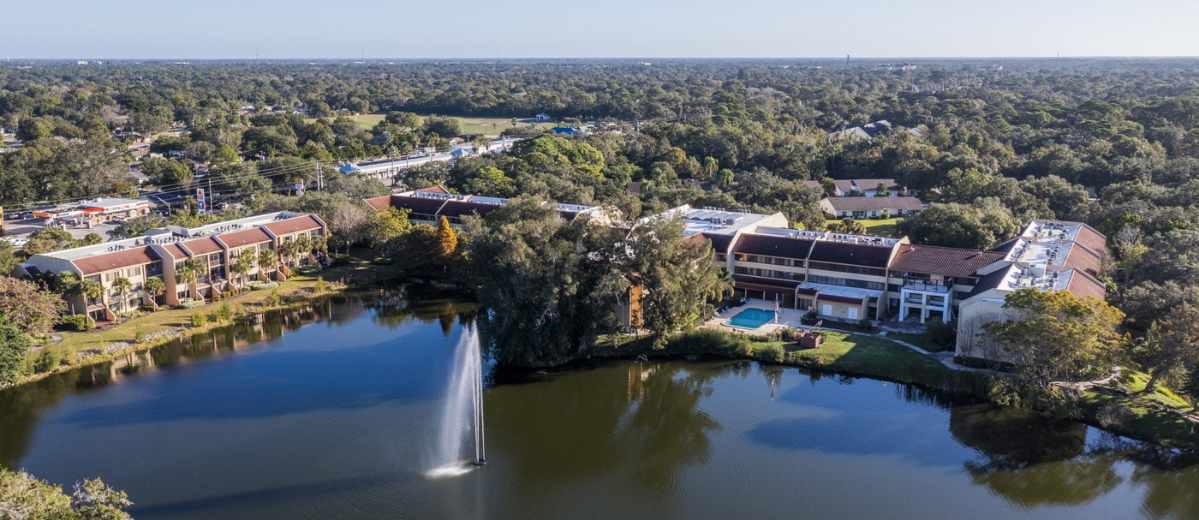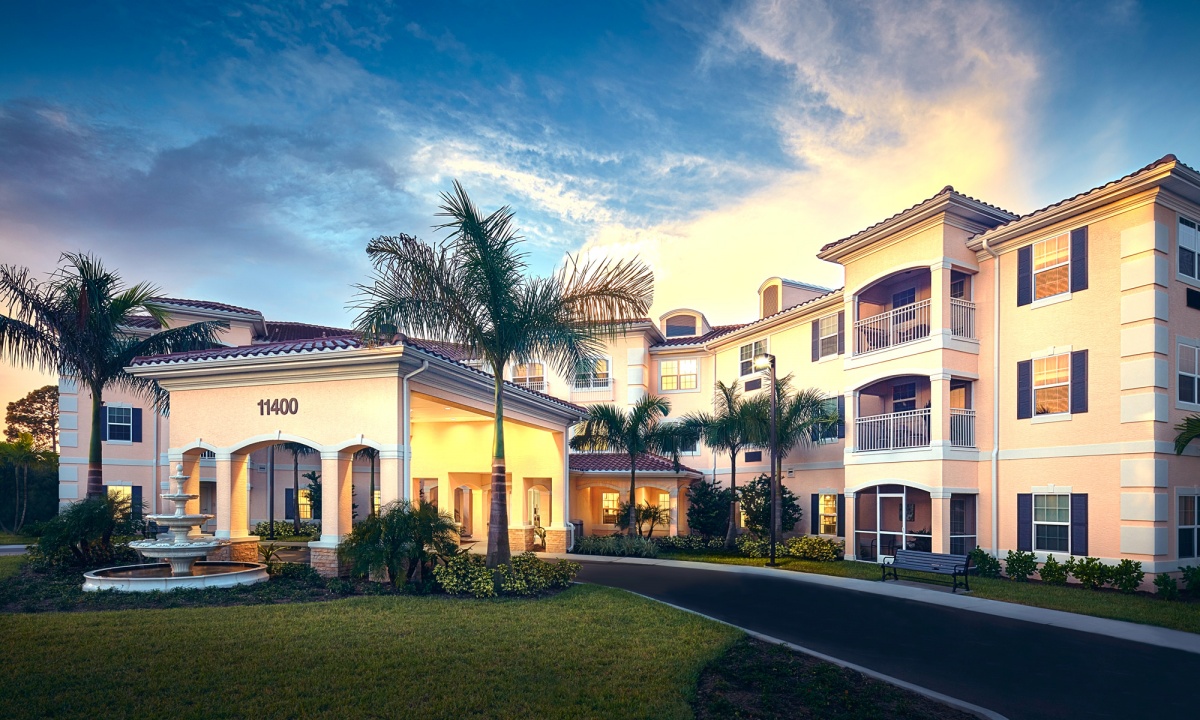Breast cancer awareness: What you should know and what you can do to help
American House Florida
For more information about the author, click to view their website: American House
Jul 17, 2023
Florida - Sarasota, Bradenton & Charlotte Counties , Florida - Southwest
Email US
Click to Email UsWhen is Breast Cancer Awareness Month?
October is Breast Cancer Awareness Month; a time when people throughout the U.S. run, walk, raise funds and do what they can to increase awareness. American Cancer Society findings indicate this disease is estimated to be the cause of death for 43,250 women and 530 men in 2022. In addition:
- As of 2021, breast cancer became the most common cancer globally, accounting for 12 percent of all new annual cancer cases worldwide, according to the World Health Organization.
- Knowing one’s family history is important, yet 80-85 percent of breast cancers occur in women who have no family history, according to the National Library of Medicine.
- One in eight U.S. women, around 13 percent, will develop invasive breast cancer over the course of her lifetime, according to the American Cancer Society.
Breast Cancer in Seniors
Older age increases the risk of several types of breast cancer. However, advancements in diagnosis and highly individualized treatment plans are increasing the odds of recovery for older patients and making it possible for many to live longer, healthier lives. Some facts for older adults to consider:
- According to the National Cancer Institute, women 70 and older have a one in 24 chance of developing breast cancer at some point in their lives. Men can also get breast cancer.
- Treatment is dependent on the individual and may include surgery, hormone-blocking pills, targeted radiation or a combination of these therapies. Chemotherapy is used occasionally.
- Healthy, active, independent patients have the best chance of a good outcome.
Support Someone with Breast Cancer
When the need to get involved and make a difference is strong, there are organized events such as Race for the Cure. If breast cancer hits close to home and a friend or family member has been diagnosed, there are several ways to support them during their journey. The side effects of treatment, for example, make it difficult for people to do daily activities such as housework, shopping and caring for their family. Keeping the person’s individual needs in mind, your support may include:
- Transporting to and from hospital appointments
- Cleaning and vacuuming
- Washing clothes and ironing
- Gardening or yard work
- Cooking meals for freezing
- Taking children to or from school and activities
- Babysitting
- Shopping and pharmacy runs
- Walking dogs
- Organizing pantries or closets to make items more accessible
Simply being available is the most important thing you can do to support your friend or family member. Include them in plans and let them decide if they’ll attend. Accompany them to doctors’ appointments to serve as a “second pair of ears,” join them for a movie, check in with a call or text, or just sit and listen when they need to talk. Sometimes the only thing someone needs is a hug and, surely, we all have one of those to share.
Breast Cancer Awareness Ribbons
During the month of October, you’ll notice people wearing pink ribbons. These breast cancer ribbons have become universal symbols of the breast cancer cause, raising awareness and bringing people together in solidarity. Making your own ribbons is easy and wearing them throughout October shows your support for those battling breast cancer.
Ongoing, Dedicated Awareness is Critical.
While October is an important month to spotlight breast cancer, the need for awareness isn’t limited to one month. Every day is an opportunity to make a difference. Help get the word out about the importance of health screenings and take a moment to consider how you can support your community, friends and family members. When we work together, a little time and effort go a long way.
- To view the original version of this article visit www.americanhouse.com/blog/breast-cancer-awareness-what-you-should-know-and-what-you-can-do-help
- Seniors Blue Book was not involved in the creation of this content.
Other Articles You May Like
You might be done with school, but you still need to take some testS
Working adults and retirees may be far removed from school and the stresses that come with high-stakes testing.No matter our age, though, were not done taking tests. Unlike the pop quiz in English literature, algebra or world history, the tests we take as older adults are some of the most important exams in our lives.Colorectal cancer is one of the most common cancers and the second-most common cause of cancer death in the U.S. and worldwide. The American Cancer Society estimates that two-thirds of colorectal cancer deaths occur in patients over 65. However, if caught early, cancer of the colon is highly treatable and often curable.In 2021, the U.S. Preventive Services Task Force lowered the recommended testing age for colorectal cancer from 50 to 45 due to an increase in its incidence among younger individuals. Gen Xers, Baby Boomers and older generations who are up to date on their testing likely have already completed a colonoscopy, the gold standard of testing for this dangerous cancer. This screening test is highly important because colorectal cancer often doesnt have symptoms in the initial stages.The screening uses a scope to look for polyps, a small clump of cells that forms on the lining of the colon. Most colon polyps are harmless, but some can become cancerous. When cancer forms in a polyp, it grows into the wall of the colon and eventually can spread to distant parts of the body. During a colonoscopy, the doctor can remove colorectal polyps to help prevent cancer.While the test itself is done under general anesthesia, the preparation for a colonoscopy is often what people dislike. To make sure doctors can see polyps, the colon must be clean and empty before the procedure. That means everything in your bowel must go, which is accomplished by drinking large volumes of water mixed with a laxative the day before, and sometimes the morning before, the procedure. The liquid results in diarrhea and considerable time in the bathroom as your colon is cleared. You will also be on a clear-liquid diet the day of the procedure.The preparation can be unpleasant. Perhaps that is why four in 10 Americans aged 45 and older are not up to date on their colorectal cancer screenings, according to the American Cancer Society.But there is good news. People who dont have other risk factors generally only need to have a colonoscopy every 10 years. Also, a lot has changed in recent years. Today, the preparation liquid (often a gallon) does not need to be consumed in one sitting and may be taken the night before and the next morning, making it more tolerable. The solutions are also better-tasting than they once were.Also, there are some alternatives, including lower-volume solutions and a pill prep involving 12 tablets taken twice with large amounts of water. In addition, the FDA has approved three types of stool tests to screen for colorectal cancer at home. They should be completed every one to three years. If a stool test is positive, which doesnt always mean cancer is present, a follow up colonoscopy is necessary. There are things we can do to prepare for a colonoscopy to make the preparation less unpleasant: The less you have in your stomach before colonoscopy preparation, the easier it will be. Start eating smaller portions and reducing fiber five to seven days in advance. The week before a colonoscopy, avoid nuts and seeds, popcorn, red meat, raw vegetables, corn, peas, broccoli, cabbage, dried beans, whole grain bread and pasta, brown or wild rice, fruit with skins, fried foods and cereals like oatmeal, shredded wheat and granola. Chill any liquid preparation, as it is often easier to drink when its cold. Use a straw to bypass the tastebuds in your mouth as you drink the preparation. Suck on lemon slices or sugar-free menthol candy while you drink or after each sip to help with the taste. Mix in sugar-free water flavorings that are clear, not red, blue or purple. If nausea was an issue during a previous preparation, ask your doctor for anti-nausea medicine in advance. While age is a risk factor for developing colorectal cancer, increasing physical activity, maintaining a healthy weight, not smoking and limiting alcohol can reduce the risk of developing colorectal and other cancers. Even if you were inactive in your younger years, becoming active when you are older can lower your risk.Your primary care doctor can help you keep track of preventive services, like screening tests and vaccines, as well as help make lifestyle recommendations such as diet and exercise to help reduce risk for illness.About the AuthorJaimenee Jaime Khemraj is chief medical officer for Healthcare Network, which has practices throughout Collier County offering family care, dental care and pharmacy as well as behavioral health counseling. For more information, visit HealthcareSWFL.org, or to schedule an appointment, please call 239-658-3000.
Early Detection of Colorectal Cancer Can Save Your Life
Early Detection of Colorectal Cancer Can Save Your LifeColorectal cancer, sometimes referred to as colon cancer, is one of the leading causes of cancer-related deaths in the United States, but with early detection and proper treatment, it can be prevented and managed. March is Colorectal Cancer Awareness Month, and at Assisting Hands Home Care, we want to spread awareness and educate the public on the importance of screening and early detection.Colorectal cancer begins in the colon or rectum and can spread to other parts of the body if not detected early. The good news is that colorectal cancer can often be prevented with regular screening and detected early through screening tests such as colonoscopies. The American Cancer Society recommends that people at average risk of colorectal cancer start regular screening at age 45 and continue until age 75.Symptoms of colon cancer can include changes in bowel habits, rectal bleeding, abdominal pain, weakness, and fatigue. If you experience any of these symptoms, seeing a doctor promptly is important.There are several risk factors that can increase the chances of developing colon cancer, including age, family history of colorectal cancer, personal history of colorectal polyps, a personal history of inflammatory bowel disease, and lifestyle factors such as a diet high in red and processed meats and low in fruits and vegetables, as well as physical inactivity and smoking.To reduce the risk of colon cancer, medical experts often recommend a diet low in animal fats and high in fruits, vegetables, and whole grains to reduce the risk of other chronic diseases, such as coronary artery disease and diabetes.According to the NIH, a significant association was observed between high nut consumption and a reduction in colorectal cancer among women (in those with an intake of 3 servings of nuts per week compared to those that declared no nut consumption).Some studies suggest that people may reduce their risk of developing colon cancer by increasing physical activity, keeping a healthy weight, limiting alcohol consumption, and avoiding tobacco. For more information on reducing your risk, visit the CDC website.At Assisting Hands Home Care, we understand the importance of early detection and management of colorectal cancer. Our trained and compassionate care providers are available to assist with transportation to and from doctor appointments and provide support during recovery from any necessary treatments. We also offer assistance with daily activities such as meal preparation and housekeeping, allowing our clients to focus on their health and recovery.In conclusion, colorectal cancer is a serious health concern, but regular screening and early detection can prevent and manage it. At Assisting Hands, we are committed to educating and supporting our clients and their families on the importance of colorectal cancer awareness and early detection. If you or a loved one is in need of support and assistance during a cancer journey, contact us today to learn more about our in-home care services.To find an Assisting Hands location near you, visit https://assistinghands.com/location-finder/
October Is Breast Cancer Awareness Month
Knowledge Is the Best Defense Against Breast CancerBreast cancer is an unsettling topic for any woman. Besides the dread it induces, cancer also perplexes and frustrates with its unpredictability. Some general risk factors for any persons chance of having breast cancer have been established, but more is unknown than known about the specific causes and how or if they can be predicted in any given person. In fact, 60-70% of women with breast cancer have none of the risk factors in their backgrounds, while others with these specific risk factors never develop cancer. This puts the pressure on early detection and being always vigilant, that is, regular screening by your doctor, self-examination and being educated about early symptoms. In a word, knowing. October is an entire month dedicated to knowing more about breast cancer. Breast Cancer Awareness Month brings a special focus to a disease projected to affect 276,480 women and to cause 42,170 deaths this year. The topic of breast cancer among senior women gets less conversation than it should. This month would be an opportunity to change that. The Particular Problem of Age and CancerSo many of the dramatizations of breast cancer in the media and advertising feature women under 50 or 60 that you could get the impression that it is primarily a younger womans disease. But the Breast Cancer Research Foundation actually terms breast cancer a disease of aging. The Foundation reports that the median age for breast cancer is 62 and that around a quarter of women who develop the cancer are between 75-84. The population overall continues to age, and the result for breast cancer will be a doubling of cases by 2030, with most of the affected between the ages of 70 and 84. Understanding breast cancer in older women may require a radical change in perception, then. Why the seeming bias? Many circumstances contribute. For one thing, older adults are most often excluded from clinical trials. Inevitably, the research reports for a younger population. This also creates a knowledge gap in the medical professions. The lack of geriatric oncologists, those physicians who specialize in cancer among the aging, further limits the understanding and clear pathways to treatment. Of the many types, the predominant breast cancer is generally in the category of invasive or infiltrating breast cancer, accounting for 70-80% of all cases. This type invades the milk ducts of the surrounding breast tissue and spreads. The treatment depends on the protein structure of the cancer cells, and will probably require a biopsy to determine the cell makeup. Far too many variables to describe here apply. The point is that only your doctor and specialist can make diagnoses and should be consulted early and regularly for examinations. Self-diagnosing, as with all disease, is particularly untrustworthy, but self-examination is recommended and useful. Lifestyle and Environment Risk FactorsLegend Senior Living puts the health care of seniors first. While the term health care may conjure all things clinical, the practice of health and wellness at every Legend residence is part of the purposeful design of the residence itself. This includes the physical environment, the activities comprising our Life Enrichment programming, the concentration on proper nutrition and options for exercise, no matter the residents mobility limitations. All of these factors are extremely important to reducing risks of disease and physical injury generally, and cancer in particular. The National Breast Cancer Foundation lists a few of the major factors that you can modify to influence your own health. At Legend communities, our Legend Experts in Senior Living, our staff of associates, are well-trained in assisting residents with lifestyle modification that can reduce your risk of breast cancer. Exercise and ActivityA lack of physical activity directly relates to your risk for breast cancer. Increasing activity reduces your risk. This activity can take many forms, and well-designed senior living residences offer dozens of combinations. A few minutes a day in a fully equipped exercise room, especially with the coaching of an Associate, can be fun, rewarding, and not too physically demanding. Group exercise, aerobics, water aerobics, games and sports also abound. Eating WellDiet is especially important in reducing breast cancer risk. Older adults tend to have diets higher in saturated fat, because eating habits were long established before we knew as much as we do now about the effect of fat intake on health. Too, if a senior is unable to grocery shop as frequently as theyd like, their diet may lack fruits and vegetables essential to prevent diet-related health issues, cancer in particular. Residents at a well-staffed senior living residence should have the option for three chef-prepared meals every day, all designed under the supervision of a licensed nutritionist. Eating and Drinking HabitsBeing overweight or obese can increase your risk for breast cancer, especially post-menopause. So does overconsumption of alcohol. Both of these factors can be greatly influenced by lifestyle. The more active you are, with better control of your diet, the easier it is to control your weight and lessen the need for medication (alcohol being a common type of self-medication for depression and loneliness). Other FactorsOlder women should also be aware of the effects of having had radiation therapy to the chest before the age of 30, as well as having taken hormone replacement therapy for menopause. Both factors can increase the risks of breast cancer. Consulting your physician is the best practice in these cases. What Doesnt Cause Breast CancerBeing well-informed and knowledgeable about breast cancer can keep a lot of stress out of your life. It will also keep you from pursuing procedures and remedies that are ineffective, unnecessary or radical. The following are all cited as Myths About Breast Cancer by the National Breast Cancer Foundation: Finding a lump in your breast does not mean automatically mean you have breast cancerA mammogram will not cause breast cancer to spreadHaving a family history of breast cancer does not mean you are likely to develop breast cancer, tooBreast cancer is not contagiousShowing the gene mutation BRCA1 or BRCA2 in your DNA does not mean you will definitely develop breast cancerAntiperspirants and deodorants do not cause breast cancer Breast Cancer Awareness Month this October is the perfect occasion to learn, but let it be just a start to year-round awareness and vigilance, especially for older adults. Regular visits to your physician cant be replaced by any amount of education, so dont skip your checkups!
Local Services By This Author
American House Sarasota
Memory Care 4540 Bee Ridge Rd., Sarasota, Florida, 34233American House is dedicated to providing personalized care and support for residents, ensuring their health, happiness, and individual needs are prioritized. The focus on creating a care plan tailored to each resident's personal well-being reflects a commitment to understanding and honoring their unique stories and experiences.The American House Living Well Memory Care program is particularly noteworthy, as it incorporates research-based findings on brain health and cognitive stimulation. By emphasizing social interaction, nutritious meals, stimulating programming, and physical activity, the program aims to support residents in living their best lives while providing continuous care and support from a dedicated team.Cognitive stimulation plays a crucial role in resident care, with daily social-based brain training workouts designed to maintain cognitive abilities and prevent decline. Additionally, sound nutrition is prioritized, with mealtime offerings that cater to residents' personal choices and nutritional needs, while also encouraging social interaction and fostering joy.Physical activity is another essential component of the care plan, with each resident receiving a unique daily plan that includes gentle, effective movements aimed at maintaining balance, preventing falls, and enhancing daily living skills.Lastly, social engagement is emphasized as a key aspect of person-centric care, ensuring that every resident benefits from socialization in a way that suits their individual preferences and needs. Whether residents are social butterflies or require support and encouragement, American House strives to create an environment where everyone feels included and valued.Overall, American House appears to be committed to providing comprehensive and compassionate care that enhances residents' quality of life and supports their overall well-being.
American House Sarasota
Independent Living 4540 Bee Ridge Rd., Sarasota, Florida, 34233American House communities are havens for those seeking a vibrant and fulfilling lifestyle without the burdens of home maintenance. The emphasis on private apartments and maintenance-free living ensures that residents can enjoy their independence while residing in a warm and welcoming environment designed around their needs.The array of amenities and engaging activities offered cater to a diverse range of interests, ensuring that there's always something new to experience and someone to share it with. From group exercises to gardening, shopping excursions, and community involvement, residents have the opportunity to stay active and engaged in activities that bring them joy.The Life Enrichment program, with its robust calendar of social, cultural, and recreational events, including celebrated happy hours, adds an extra layer of excitement and camaraderie to daily life.The comfort and convenience of well-appointed apartments and full-service amenities, such as restaurant-style dining, housekeeping, and transportation services, further enhance residents' quality of life, allowing them to focus on the activities and experiences that matter most to them.Overall, American House communities offer a lifestyle of freedom, companionship, and fulfillment, where residents can truly embrace their next chapter with confidence and enthusiasm.
American House - Bonita Springs
Assisted Living 11400 Longfellow Lane, Bonita Springs, Florida, 34135American House Senior Living Communities, located at 11400 Longfellow Lane in Bonita Springs, FL, offers fully remodeled senior living in a warm, welcoming environment. Our community provides a wide range of amenities, services, and activities designed to enhance the lives of our residents. We offer assisted living, living well memory care, respite stays, and coordination of hospice care.Our community has been awarded Best Assisted Living in Bonita Springs in 2023 and is conveniently located between Fort Myers and Naples on a 26-acre campus with beautiful, landscaped grounds, ponds, and wildlife. Our apartments range from studios to one- and two-bedroom units, some with pond views, and all residents have access to our spacious common areas.We offer a maintenance-free lifestyle, allowing residents to focus on themselves. Whether you prefer relaxing by the pool, shopping trips, or socializing at our daily happy hour, the choice is yours.Our vibrant community offers activities and friendships, with assistance available when needed. Our services include meals, laundry, medication reminders, physical therapy, and activities of daily living. We also offer a variety of floor plans to suit your needs.Visit us today for a tour of our newly renovated community and see why American House is the right choice for your senior living needs.



